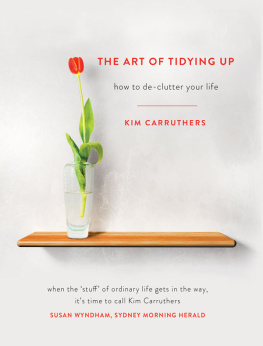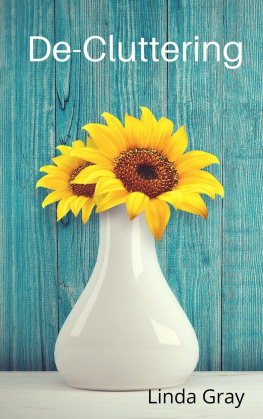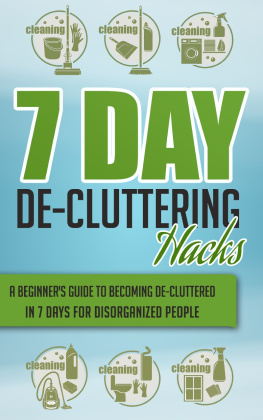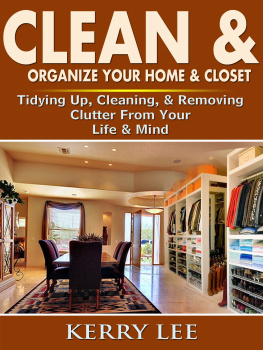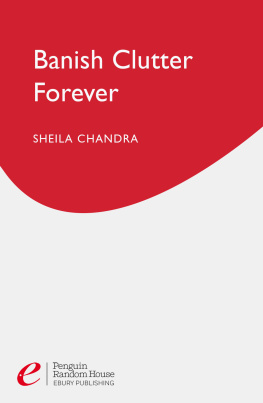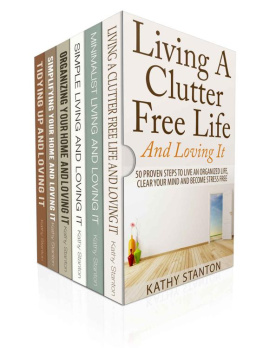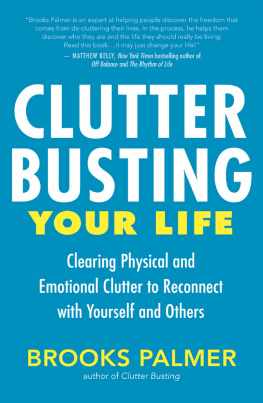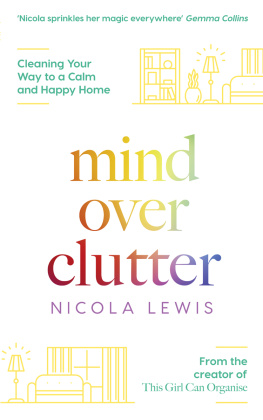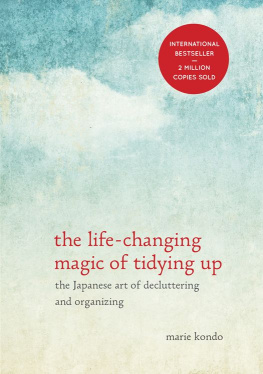
equipment
a timer any sort of timer, watch or phone clock will do
a camera the one on your phone is fine, to take a before and after photo to help you keep motivated
a permanent marker (with a thick tip so it doesnt rip holes in plastic bags)
a rubbish bag
a recycling bag or your kitchen recycling bin
a rehoming bag, box or basket (for things that belong elsewhere in the house)
a labeled donation box or bag
a return bag for borrowed items like library books or a friends DVDs

approach
START: SORT: SOLVE: SYSTEM: STOP ( AND TAKE A PHOTO )
start
define a small area.
make sure you have the time
get your equipment
remove distractions
NO PILES
take a photo
sort
rubbish
recycling
rehome (aka put away)
return
donate
solve
empty rubbish and recycling
put away the rehome items
put the donations and
returns where they need to wait for action
system
how will you prevent this clutter happening again?
stop
take your after photo
congratulate yourself
relax
THE ART OF TIDYING UP
how to de - clutter your life
KIM CARRUTHERS

The Art of Tidying Up by Kim Carruthers
First published as Less is More by Jane Curry Publishing 2013
This edition published by Ventura Press 2015
PO Box 780 Edgecliff
NSW 2027
Australia
www.venturapress.com.au
Copyright Kim Carruthers, 2015
All rights reserved. No part of this book may be reproduced or transmitted in any form or by any means, electronic or mechanical, including photocopying, recording or by any other information storage retrieval system, without prior permission in writing from the publisher.
National Library of Australia Cataloguing-in-Publication entry
Carruthers, Kim.
The Art of Tidying Up / Kim Carruthers.
ISBN 978-1-925183-17-7 (print)
ISBN 978-1-925183-51-1 (epub)
Cover image: Shutterstock
Cover design: Melissa Keogh
Internal design and layout: Melissa Keogh
Production: Jasmine Standfield
Printed in Australia by McPhersons Printing Group
to my mum,
who taught me that the time we give to others
is more important than the state of our
housekeeping.


contents

introduction
You are not alone you just feel that way right now. Sometimes it seems like everyone else lives in an immaculate home. TV programs never show a mess unless it is written into the script as the night after the party. Real estate advertisements show acres of clear floor space and gleaming glass. We all know someone who manages to raise a large brood of talented, smiling children and unruly pets while still living in a show home.
If you feel that you are the only one with a clutter problem, perhaps it is because only the people who live in clean, tidy homes actually feel confident enough to invite you over.
who are clutterers?
Most clutterers are people who have the rest of their lives under control. They hold down responsible jobs, walk out of the house in the morning looking well-groomed and get their kids to school every day with a sports uniform and lunch in their backpacks.
What no one sees is the incredible effort needed to do that when car keys vanish under piles of laundry, homework is somewhere in that pile, and making lunches requires a dash to the shops because there is no bread.
Why do we keep things when they make our life harder?
Many of us were brought up in an era when space was plentiful but possessions were expensive. Did the house in which you grew up have a garage, attic, spare room or shed? More and more families are now living in high-rise accommodation, with limited storage space and no garage.
Chances are you started your life with a mind schooled to store things yet now you live in an environment where you have nowhere to store them.
Often it is the arrival of children that turns this attitude into a real clutter problem. Stored baby clothes, toys, maternity clothes, pre-baby work clothes and will I ever get my body back? clothes all mount up and there isnt the time (or energy) to manage them.
Learning de-cluttering skills will help you if:
You arent sure how to go about de-cluttering. You start a small job and it morphs into a major disaster.
You are a perfectionist you cant start a job unless you know you can do it perfectly.
Youve been raised to be thrifty, and havent noticed that today it is more expensive to store than to sell and buy again if needed.
You want to keep good records but dont know what to keep or for how long, so keep everything just in case.
You want to be environmentally friendly, but havent figured out that it is greener to share, borrow, exchange or rent.
EMOTIONAL CLUTTER
Stop and think hard about whether you may fall into the next category even a little bit.
Emotional clutterers share some of these characteristics:
Depression robs your energy and makes you too fuzzy to choose between what stays and what goes.
Anxiety you have a constant knot in your stomach, and it takes little to overwhelm you. Making decisions about clutter feels overwhelming.
Chronic illness it is hard to keep on top of anything if just getting out of bed and dressed is an exhausting or painful effort.
Anger youve been left holding the baby, literally or metaphorically, and are so mad you could scream. You are utterly fed up with being a life support system for everyone else.
The unhelpful spouse this is a frequent theme with clutterers. One of my students put it really well: I realised I could either spend the rest of our marriage walking around behind my spouse and children, picking up after them and being constantly angry, or give up on living in a tidy house. I chose to let go, which I guess saved my marriage if nothing else. But now Ive let it go too far.
Bereavement particularly an unexpected bereavement. Throwing away a letter is harder when you know it is the last one you will ever have from that person.
Attachment issues perhaps you didnt get a lot of love or affection growing up. Shopping and possessions make you feel more secure.
Uncertainty a marriage you expected to last forever has gone or your children are leaving the nest. You sense that the future is uncertain and fear it may not be as good as the past.
Getting help to deal with the issue, and manage the emotional or physical pain, can help you let go of the clutter. Letting go of the clutter will in turn help you manage the pain.
Your GP is a great starting point. Even if you just feel consistently blah, run it past your doctor. Something like anaemia or a thyroid problem could be robbing you of the energy you need to de-clutter.
HOARDING
I often get asked about hoarding and squalor, and how it differs from clutter.
My quick answer is clutterers want less, but dont know how to do it, hoarders want to keep what theyve got and get more. Hoarding is a serious mental condition and needs professional medical help.
Next page
